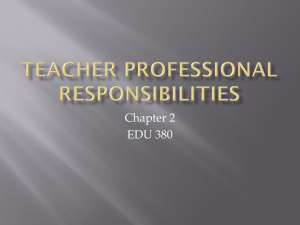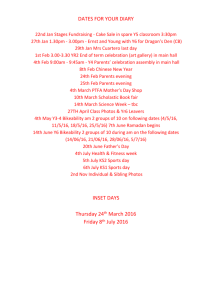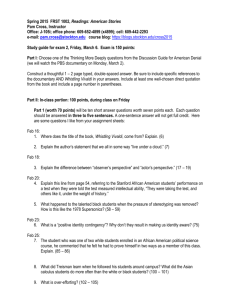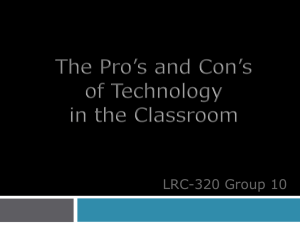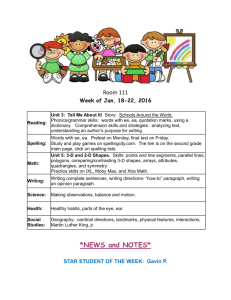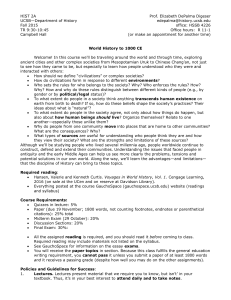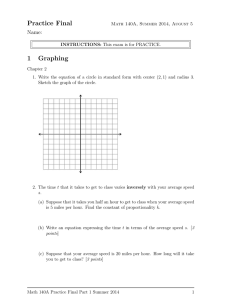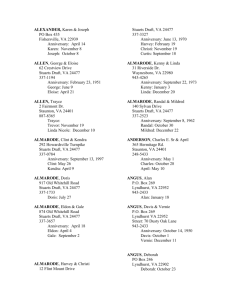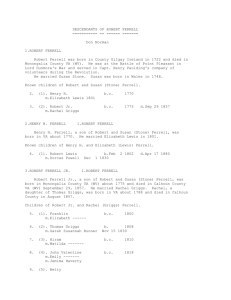Lecture Topics and Reading Assignments Please note that the
advertisement
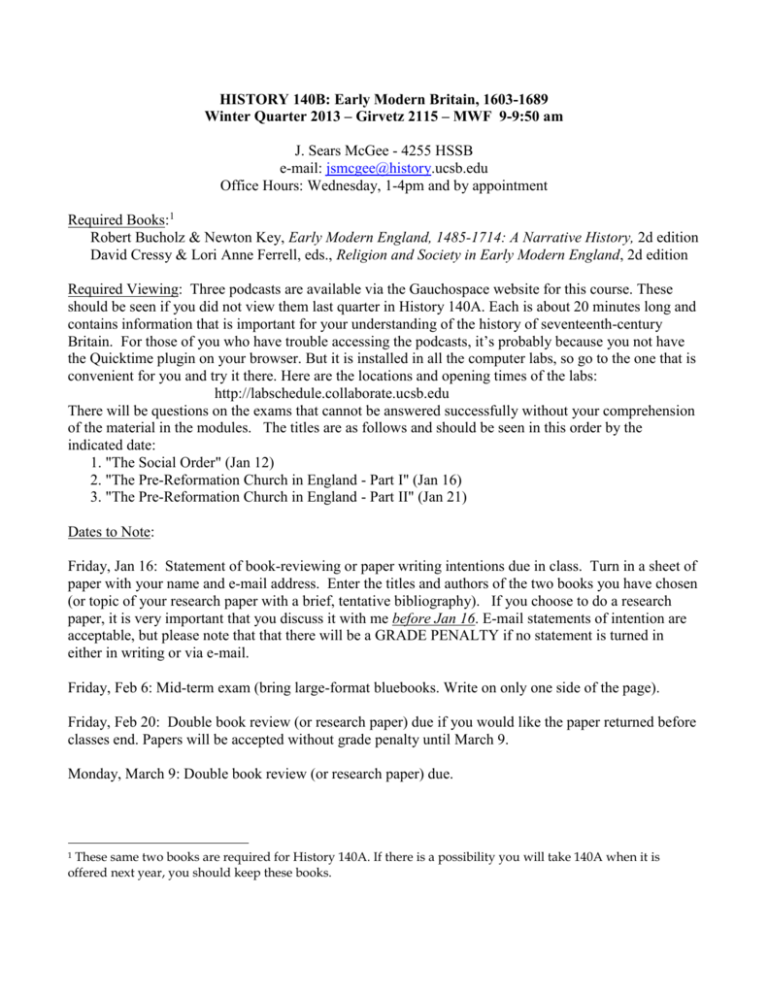
HISTORY 140B: Early Modern Britain, 1603-1689 Winter Quarter 2013 – Girvetz 2115 – MWF 9-9:50 am J. Sears McGee - 4255 HSSB e-mail: jsmcgee@history.ucsb.edu Office Hours: Wednesday, 1-4pm and by appointment Required Books:1 Robert Bucholz & Newton Key, Early Modern England, 1485-1714: A Narrative History, 2d edition David Cressy & Lori Anne Ferrell, eds., Religion and Society in Early Modern England, 2d edition Required Viewing: Three podcasts are available via the Gauchospace website for this course. These should be seen if you did not view them last quarter in History 140A. Each is about 20 minutes long and contains information that is important for your understanding of the history of seventeenth-century Britain. For those of you who have trouble accessing the podcasts, it’s probably because you not have the Quicktime plugin on your browser. But it is installed in all the computer labs, so go to the one that is convenient for you and try it there. Here are the locations and opening times of the labs: http://labschedule.collaborate.ucsb.edu There will be questions on the exams that cannot be answered successfully without your comprehension of the material in the modules. The titles are as follows and should be seen in this order by the indicated date: 1. "The Social Order" (Jan 12) 2. "The Pre-Reformation Church in England - Part I" (Jan 16) 3. "The Pre-Reformation Church in England - Part II" (Jan 21) Dates to Note: Friday, Jan 16: Statement of book-reviewing or paper writing intentions due in class. Turn in a sheet of paper with your name and e-mail address. Enter the titles and authors of the two books you have chosen (or topic of your research paper with a brief, tentative bibliography). If you choose to do a research paper, it is very important that you discuss it with me before Jan 16. E-mail statements of intention are acceptable, but please note that that there will be a GRADE PENALTY if no statement is turned in either in writing or via e-mail. Friday, Feb 6: Mid-term exam (bring large-format bluebooks. Write on only one side of the page). Friday, Feb 20: Double book review (or research paper) due if you would like the paper returned before classes end. Papers will be accepted without grade penalty until March 9. Monday, March 9: Double book review (or research paper) due. These same two books are required for History 140A. If there is a possibility you will take 140A when it is offered next year, you should keep these books. 1 Wednesday, March 18: Final exam, 8-11am (bring large-format bluebooks. Write on only one side of the page). Grades: Grades will be based on the midterm exam (20%), the double book review or research paper(40%), and the final exam (40%). Sample exams will be posted on Gauchospace. The required reading assignments are short (averaging 35 pages per week) because I expect you to give a considerable amount of time to your double book review or research paper. Books should be chosen for their significance and interest rather than their brevity. The readings and lectures provide a survey of Stuart Britain. The purpose of the writing assignment is to offer you the opportunity to work in detail upon the events, people and issues that you personally find most interesting. I will be happy to suggest topics and books if you are having trouble finding what you are looking for. Before turning in your paper or review, take care to make sure that you have observed "The Official Rules: Writing for History 140," which you will find on Gauchospace. A copy is also available on the website. Besides suggestions on matters of style, I have listed numerous errors that I frequently find in papers from UCSB students (spelling, punctuation, etc.). A good many of these common errors will not be caught by spell-check programs (e.g., “thrown” for “throne,” “rein” for “reign,” “populous” for “populace,” etc.). The grade penalties specified in the handout will be rigorously enforced. I will be happy to read a draft of your paper, write comments on it and return it in time for you to revise it if you wish. The deadline for submission of drafts, however, is Feb 20. Research papers: these should be 8-10 pages long (2000-2500 words). They should employ at least five sources (books and, in some cases, articles in scholarly journals), and it is very important that you discuss the topic (or topics) you have in mind no later than Jan 16. Up-to-date and scholarly sources should be used. Double book reviews: The two books should be chosen from the list below with care so that your combined review of them will constitute a coherent essay. The subjects need not overlap completely. But there should be significant points of comparison and contrast, and you should make the most of whatever potential exists for drawing material from both works for comparative discussion. The comparison/contrast might be quite direct (as in the case, for example, of an explicit disagreement between the two authors as to the cause of a particular event). Or you might be able to write about ways in which the reading of one book throws further light upon an issue or issues discussed in the other book. Emphasize the historical themes and issues in the books rather than the writing styles of the authors. The paper should be 8-10 pages (i.e., totaling 2000-2500 words). Be sure to write an introductory paragraph that gives the reader a sense of the paper as a whole and mentions both books that you are reviewing. Again, feel free to come in and ask me for further suggestions and help in solving any problems you encounter. Obviously, you will benefit by beginning to read the books early in the quarter so you will have time to seek help if you need it. Ideally, your paper would treat each book separately for a part of your space and then deal with the way that the works interconnect. Do not use a book that is not on the list below unless you have received my approval of it. 2 The numbers following each title indicate the other books on the list with which each book might be compared. They do not refer to chapters in the books. 1. Cynthia Herrup, A House in Gross Disorder – 2-4, 6-7, 9 2. Alan Macfarlane, The Family Life of Ralph Josselin – 1, 3-10 3. J. A. Sharpe, The Bewitching of Anne Gunter – 1, 2, 4, 6, 7, 9 4. Ann Hughes, Gender and the English Revolution -- 1-3, 5-9 5. Ian Gentles, Oliver Cromwell – 2, 4, 6-10 6. David Underdown, Fire From Heaven – 1-5, 7-10 7. David Underdown, Revel, Riot and Rebellion – 1-6, 8-10 8. Clive Holmes, Why Was Charles I Executed? – 2, 5, 6, 9, 10 9. Paul Seaver, Wallington’s World – 1-8, 10 10. Conrad Russell, The Causes of the English Civil War – 2, 5-9 Lecture Topics and Reading Assignments Please note that the reading assignments vary considerably in length. You should do your best to stay ahead so that you will not be left with too much to read on the eve of an exam. Copies of the required books will be found on reserve. Note that some of the identification topics on the exams will come from assigned reading in the textbook by Key and Bucholz and the sourcebook edited by Cressy and Ferrell. Some of these topics will not have been mentioned in the lectures, and for those that are mentioned in the lectures, the reading often supplies important additional information. The exams will be designed in such a way that it will be very difficult to make an A if you do not display knowledge from the documentary readings in Cressy and Ferrell’s book. Following this list of topics, you will find the first installment of an accompanying list of names and terms that will be used in the lectures. Part One: The Early Stuarts, 1603-1642 Jan 5: A Preview of the Stuart Century I. Jan 7: Early Modern Britain: Economic, Social, and Political Structures. Early Modern England, ch. 6. II. Jan 9, 12: The Heyday of Salisbury, 1603-12 (or “God’s Silly Vassal” and his “Little Beagle”). Early Modern England, pp. 212-22; Religion and Society, pp. 147-163. III. Jan 14, 16: The Rise of the Favorites, 1612-21 (or, Dainty Dishes Set Before the King). Early Modern England, pp. 222-27-; Religion and Society, pp. 163-168. IV. Jan 21, 23, 26: The Winning of the Initiative, 1621-1629? (or, A Plethora of Parliaments). Early Modern England, 227-239. V. Jan 28, 30: The Personal Rule, 1629-40 (or, “Baby Charles” Has His Way). Early Modern England, pp. 240-244; Religion and Society, pp. 169-200. VI. Feb 2, 4: The Constitutional Crisis, 1640-42 (or, the Rise of “King Pym”). Early Modern England, pp. 244-49. Friday, Feb 6 -- MIDTERM EXAM (bring large-format bluebooks). 3 Part Two: Civil Wars and the Interregnum, 1642-1660 VII. Feb 9, 11: Civil War and Revolution, 1642-49 (or, the Pot Boils Over). Early Modern England, pp. 250-262; Religion and Society, pp. 201-233. VIII. Feb 13, 18, 20: King Oliver and Army Rule, 1649-60 (or, From Praise-God Barebones to Monck’s March). Early Modern England, pp. 262-76; Religion and Society, pp. 233-44. Part Three: The Later Stuarts, 1660-1714 IX. Feb 23, 25: The Restoration, Clarendon and the Cabal, 1660-1672 (or, Merrie Olde England Again?). Early Modern England, pp.277-89. X. Feb 27, March 2, 4: The Age of the Exclusion Crisis, 1672-1685 (or, a Plethora of Plotters). Early Modern England, 290-300. XI. March 6, 9: The “Glorious” Revolution and the Revolution Settlement, 1685-89 (or, from Nosebleed to Exile). Early Modern England, 300-14. XII. March 11, 13: Culture, Thought and Society in Late Stuart Britain History 140B-- Names and Terms Preview: the Stuart Century, 1603-1689 The Early Stuarts, 1603-1649 James VI (of Scotland) and I (of England), 1603-25 Charles I, 1625-1649 The Interregnum, 1649-1660 The Long Parliament The Levellers Oliver Cromwell The Later Stuarts Charles II, 1660-1685 James II, 1685-1688 William and Mary, 1688-1702 Anne, 1702-1714 Thomas Hobbes, John Locke Inigo Jones, Christopher Wren Sir Isaac Newton 4 I. Early Modern Britain the Whig interpretation of history Parliament absolutism, constitutionalism peerage, gentry municipal corporations II. The Heyday of Salisbury, 1603-1612 Robert Cecil, Earl of Salisbury Millenary Petition, Hampton Court Conference Richard Bancroft; surplice Gunpowder Plot (1605), Guy Fawkes Foxe’s “Book of Martyrs”; recusancy purveyance, subsidy Whitehall, masques Great Contract Goodwin vs. Fortescue, the Buckinghamshire Election Case Sir Edward Coke, “the ancient constitution” Form of Apology and Satisfaction shire-knights, burgesses Committee of the Whole House Bate’s case; impositions; tunnage and poundage III. The Rise of the Favorites, 1612-1621 Robert Carr, Earl of Somerset, Lady Frances Howard Henry Howard, Earl of Northampton; Addled Parliament George Villiers, Duke of Buckingham baronetcy Alderman Cockayne; Merchant Adventurers Common Pleas, King’s Bench prohibitions Sir Francis Bacon commendams Frederick, Elector Palatine George Abbot, Archbishop of Canterbury Sir Thomas Overbury Lionel Cranfield, Earl of Middlesex Ferdinand II Gondomar (Sarmiento) [The continuation of this list of names and terms can be found on the Gauchospace website]. 5

